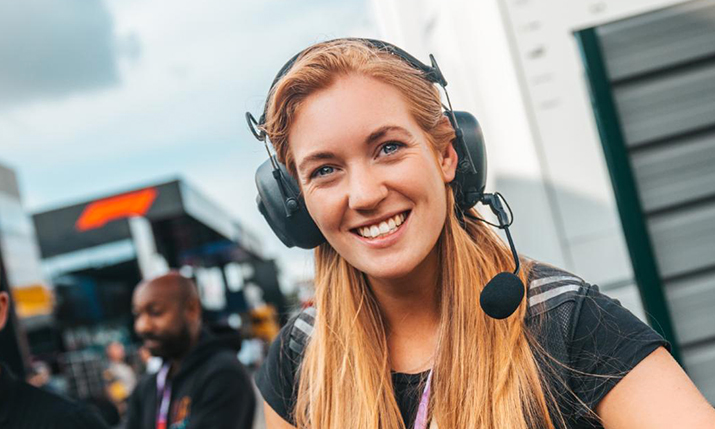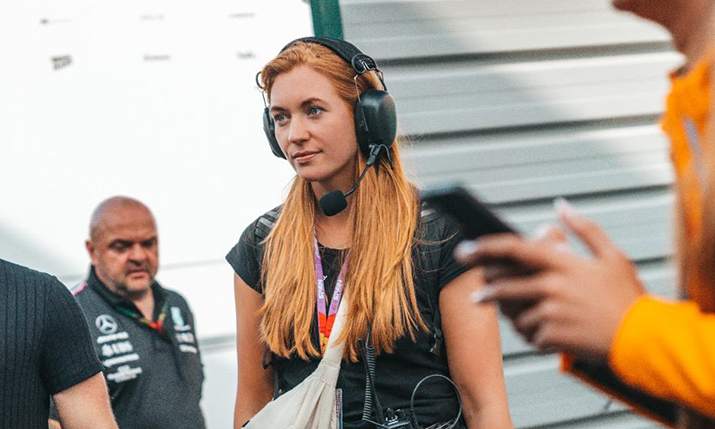Quietly confident: Whisper production manager Hannah McNally on overcoming preconceptions and embracing the unpredictability of live sports production

Whisper’s Hannah McNally works as a production manager on a Formula One highlights show for Channel 4 in the UK
Hannah McNally, production manager at Whisper, talks us through how she got a job in sports broadcasting, shares what she enjoys most, and highlights the challenges she has faced (and overcome) during the course of her career.
What first inspired you to get a job in media production?
During my time at 6th form college, I chose film studies as an A-Level and was intrigued by the anecdotes shared by my lecturer about their experiences on film sets. I decided to get some experience being on set as an extra to see what it was like for myself. I found a job ad where they wanted people with red hair for the Muppets movie filming at Pinewood Studios.
Whilst on set, I couldn’t help but notice the individual with the clipboard organising the production. It struck me then that coordinating the logistics of the programme was much more of an appeal for me and I would rather be that side of the camera, than being told what to do on camera! Whilst I loved this experience, I realised I was far too impatient for film, and that TV would be better suited to me.
And sport?
I’ve always watched live sports and been really into netball, running and CrossFit. So the idea of merging my enthusiasm for sports with the fast-paced world of TV seemed like the perfect professional trajectory. What particularly resonated with me was the vast audience that sports programming attracts.
One of the exciting aspects of working in TV is the satisfaction of showcasing the content you’ve helped to create to millions of viewers. Knowing that people are watching the shows you’ve helped create is the motivation that gets me out of bed each morning!

Hannah McNally previously worked at the BBC, on shows including the evening magazine programme The One Show
Tell us about your first steps in the industry
I started studying Film & Media at A-Level and absolutely loved it. I decided to look into Film & TV courses for University with a combination of practical and theoretical elements to work out what it was that ticked my boxes.
During University, I applied relentlessly to work experience and internship schemes and completed some placements during holidays at production companies in Norwich and London. I also worked part time in the university bar, was a student brand manager for Red Bull and President for the University Netball Club, running a 10-person committee and club of over 300 members. It was these placements and part time jobs along the way that grew my experience and bulked out my CV enough to get my foot in the door for my first job in TV.
What was your first job, how did you get it and what did it involve?
Once I had graduated University, I applied persistently for entry level jobs and then was sent a job by a family friend who spotted an advert on a Facebook group I wasn’t part of.
“As a young woman navigating this industry, I’ve encountered occasional biases and preconceptions, which can become more prevalent in male dominated sports like Rugby and Formula One. To overcome these challenges, I’ve used established female role models for mentorship and advice throughout my career”
I applied and was invited down to an interview in London two days later. The role was a junior production assistant for Angel Eye Media. I interviewed with the MD and head of production (HOP), and that afternoon I was offered the position. I remember getting the news when I was out for dinner and squealing so loudly with excitement that strangers in the restaurant started to congratulate me too!
It was an incredible first role, I was taught the ropes of production and got great experience on location and back in the office.
I undertook a diverse range of tasks, taking every opportunity that came my way. From the more mundane yet crucial responsibilities like making cups of tea and office admin, to more intricate roles such as logging, researching, and organising shoots, I immersed myself in the different areas of the industry. One memorable experience involved traveling to Ibiza as production coordinator and I was able to try my hand as a second camera op.
I was trained excellently by my HOP and left the company two years later as an experienced coordinator with a job at the BBC Events team.
And from there?
Whilst employed with Red Bull, I worked across sporting events such as the Red Bull Soapbox race, the Leeds Triathlon and Red Bull Switch Up Netball which gave me an insight into sports events from a production and operational perspective. When moving to work in TV, the initial genre I worked in was factual entertainment and reality, but I had a strong desire to try live TV.
I applied to join the BBC’s Events team, where I found myself involved in high-profile productions, including Election Day coverage, the Festival of Remembrance, and other prestigious royal events. During Covid, I was lucky enough to be drafted into several newly commissioned live studio shows at the BBC which led me to a stint on the iconic ‘The One Show’.
I loved the live OB’s and events that were linked to this programme, and whilst entertainment was so much fun, I wanted to give sport a proper go.

Hannah McNally, production manager at Whisper, in the paddock for the Spanish Grand Prix
Let’s talk about your current job. How did you get it?
Having heard good things from colleagues, I applied to work at Whisper and was offered the role of junior production manager on Formula One. I worked on this for two years, gaining valuable insight into the world of sport and helping out alongside other productions along the way – such as WSL, England Netball, Wheelchair Rugby and then moved over to the World Rugby team for six months to work on their branded content. I gained enough experience both onsite and back in the office to step up to production manager, where I have just started on the Formula E contract at Whisper. I’ll be travelling to all the races across the Season 10 calendar and ensuring the broadcast of the English language programme runs smoothly back in White City too! Later in the year, I also hope to get involved in the C4 coverage of the Paralympic Games.
Why did you go for it?
It was something completely different and out of my comfort zone. I wanted to travel the world with my job, see new cultures and work on sports that are popular – so this felt like the perfect opportunity.
What challenges does the role pose and, conversely, what is most rewarding about it?
Learning the complexities of a completely new sport, the different organisations and key stakeholders that contribute to making a programme like Formula One Highlights for C4 was a challenge originally. Once I had learnt the ropes, the role was rewarding. It required huge attention to detail and forward planning to keep rolling through 23-race calendar. Last-minute changes to crew and logistics were a common occurrence, demanding composed decision-making and an unflappable attitude both on site and back at base.
“Be confident and stay passionate; when it gets busy and tough you can forget how exciting an industry can be and you forget to look up and take in the amazing places you are and projects you’re a part of”
One of the best parts of the role was on location with the team – where you reap the benefits of a well organised production and the hard work put in at the office. You would be juggling the requests of the presentation team, crew and production in a new country and would often have to think on your feet. It was incredibly rewarding, and I have some memories that I will cherish forever.
Have you faced any obstacles during the course of your career and, if so, how did you overcome them?
I have encountered various challenges, some of which are influenced by my gender and age. As a young woman navigating this industry, I’ve encountered occasional biases and preconceptions, which can become more prevalent in male dominated sports like Rugby and Formula One. To overcome these challenges, I’ve used established female role models for mentorship and advice throughout my career.
However, I’ve been extremely lucky to be supported in a diverse working environment during my time working in production. There has been a real push to get the gender balance equal both in front and behind the camera – and I’ve worked within some incredibly strong female teams across the years.
What’s the most demanding thing about working in live sport and why?
The unpredictability and real-time nature of the events. Unlike pre-recorded content, live sports production demands split-second decision-making and problem solving to make sure the show is delivered perfectly. The pressure to deliver a seamless broadcast with the unpredictable nature of sports, where unexpected events, technical problems, or weather-related issues can occur, adds an extra layer of difficulty.
In addition, the global nature of many sports events means working across different time zones, and within different cultures which can create further logistical challenges. If on location, it shouldn’t be forgotten how exhausting travel can also be – long haul flights, jet lag and living out of a bag can be difficult to navigate in both a personal and professional capacity.
Have you been privy to any innovations in sports broadcasting that have helped you, your company or the audience?
I think an exciting thing that Whisper is doing, is changing the landscape of on-screen presentation for sports, aiming to create a more inclusive and diverse representation that reflects the real world. By working towards closing the gap between the on-screen world and reality, Whisper is fostering a more authentic and relatable viewing experience.
When audiences see a diverse range of individuals on television, it not only reflects the real world but also provides a more inclusive space for people of all backgrounds and demographics. Also, by allowing young children to see individuals who “look like them” on television, Whisper is providing role models and inspiration for the next generation.
Finally, what’s the coolest thing you’ve worked on in the course of your career and why?
Formula One Highlights for Channel 4 is one of the coolest productions I’ve worked on. It was a completely new sport to me, I travelled to places I hadn’t even heard of – and I worked with some of the best team members and high-profile talent. It was an unforgettable two years, and I learnt a lot over the course of my time on the production.
I also worked within the World Rugby team and we were commissioned to deliver a campaign called ‘We Are Rugby’ which was to be played during the Rugby World Cup. This was a short trailer which embodied what rugby was and how it connected players and fans across the world. We had a huge number of shoots across two weeks (nearly 20!) with well-known rugby players in remote locations. The final result was brilliant, and the hard work was well worth it.
What advice would you give to other women looking to move into a role in sports broadcasting like your own?
My main advice would be to be persistent and resilient. The industry can be competitive and challenging at times, so use mentors for advice and support too. Be confident and stay passionate; when it gets busy and tough you can forget how exciting an industry can be and you forget to look up and take in the amazing places you are and projects you’re a part of.

